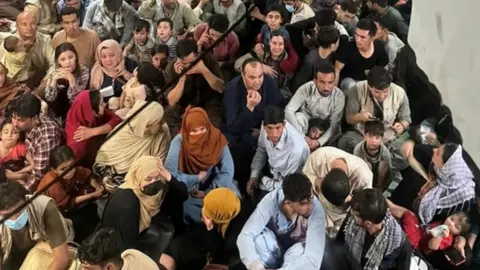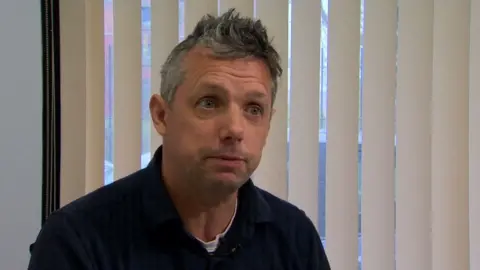Afghan refugees 'stranded with no idea of future life'
Eight months since thousands of Afghans fled from the Taliban and arrived in the UK, many are still living in hotels.
Others are stranded in Afghanistan, desperate to get out.
Earlier this year, the Home Office said about 37,000 asylum seekers and refugees were living in hotels across the UK at a cost of £4.7m each day.
A total of £1.2m is to accommodate Afghan refugees and another £3.5m a day on asylum seekers.
The Home Office was unable to provide a figure for the number of Afghans currently living in hotels in Northern Ireland.
 Defense One/Handout via Reuters
Defense One/Handout via ReutersMozhdeh, 21, has been in a hotel in Belfast since arriving in Northern Ireland four months ago. She is seeking asylum.
"Four months in one room is very hard for me. I wasn't expecting this," she said.
"I don't know what's going to happen next, I'm just waiting, I'm trying to be patient.
"I was expecting to come here and everything would be alright, I would have a home, and I would go to university to do my studies.
"I thought as a refugee I would be asked what I want; what I'm looking for - but in the hotel, no-one knows my situation."
Her home in Afghanistan has been destroyed.

Many Afghans living in Northern Ireland have been watching the government's Homes for Ukraine scheme with interest.
It allows people and organisations in the UK to offer a home to Ukrainians fleeing war. Sponsors receive £350 per month.
"I'm so happy that people all around the world help Ukraine," said Mozhdeh.
"On the other hand, I also feel sorry about Afghans - we are more than 30 years in war and no-one cares.
"How people are treating the Ukraine crisis is different than they're treating Afghan people... we are all the same, it doesn't matter that we don't have white skin and blue eyes."
Resettlement a "complex process"
In January, the UK formally opened the Afghan Citizens Resettlement Scheme.
The Home Office plans to resettle more than 5,000 people in the first year and up to 20,000 thereafter.
The scheme will prioritise "those who have assisted the UK efforts in Afghanistan and stood up for UK values".
"Housing those we resettle can be a complex process but we endeavour to use every property that is offered for the scheme," a government spokesperson said.
"Councils have been given integration funding to support those starting a new life in the UK, with £20,520 per person provided over three years to meet the costs."
Meanwhile, others remain in Afghanistan and are desperate to escape.
One artist who did not want to be named because he is under threat from the Taliban said he had "lost his life overnight".
"I lost the chance to work, paint, or even continue my simple daily life for the simple reason of being an artist who has worked for democracy and enlightenment," he said.
Last week, he said that his brother was killed by the Taliban.
Now he and his wife are at risk and need to leave.
He applied for a visa for Northern Ireland eight months ago but is still waiting.
"Ukraine is being supported by the other countries of the world as a pure act of humanity," he said.
"The Taliban are killing our young, creative generation. So don't you think we have to be taken as seriously as Ukrainians?" he asked.
The Home Office said it did not comment on individual cases.

Local music and arts organisation Beyond Skin is supporting the artist who wants to get to Northern Ireland.
Darren Ferguson, founder of Beyond Skin, said: "How come one race is given priority over another race, when they're all victims of war?
"We have people on our shores who need help, and they're being ignored because of the colour of their skin. That needs to be addressed as soon as possible."
He called for the process to be "more equal and transparent".
A Home Office spokesperson said: "The brutal and barbaric invasion of Ukraine has meant we needed to move quickly to set up schemes so that people can find safety in the UK, but the tireless work to support Afghans also seeking housing continues and to suggest otherwise is wrong.
"The UK has made one of the largest commitments to resettle Afghan refugees of any country so far. We have moved - or are in the process of moving - over 6,000 Afghan evacuees into homes."
The spokesperson said housing Afghan individuals and families was "complex" and the government was supporting people with many different needs.
